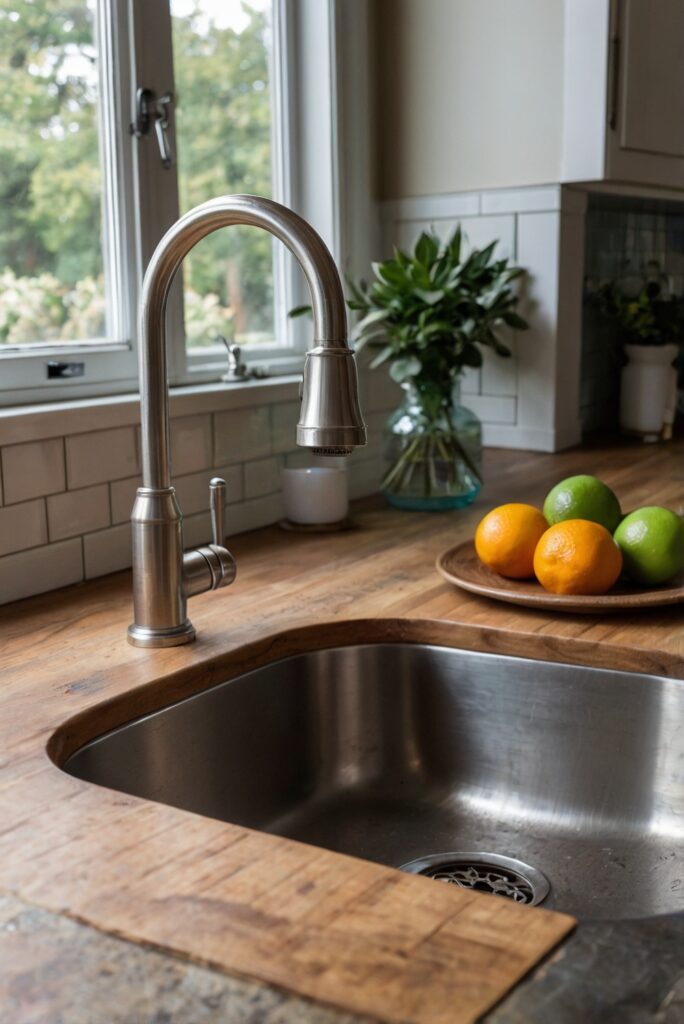Discover the best practices to keep your kitchen sink sparkling clean! From basic maintenance to deep cleaning, learn how to maintain your sink effortlessly.
Top Tips for Maintaining and Cleaning Your Kitchen Sink:
Regularly clean your sink with a mixture of warm water and dish soap to prevent buildup and keep it looking shiny.
Use a soft sponge or cloth to avoid scratching the surface of the sink.
To remove tough stains, consider using a paste made of baking soda and water.
For stainless steel sinks, polish the surface with a mixture of water and vinegar to maintain its shine.
Avoid leaving dirty dishes in the sink for extended periods to prevent bacteria growth.
Consider installing a sink strainer to catch food particles and prevent clogs.
Use a garbage disposal cleaner regularly to keep the drain free from odors and blockages.
Periodically check for leaks and repair them promptly to avoid water damage to your cabinets.
By following these tips, you can ensure that your kitchen sink stays clean and functional for years to come.
Regular Cleaning:
Maintaining a clean kitchen sink is crucial to prevent the buildup of bacteria, mold, and odors. Regularly clean your sink with a mild soap or dish detergent and warm water. Use a soft sponge or cloth to scrub the sink surface and rinse thoroughly. Avoid using harsh chemicals or abrasive cleaners, as they can damage the sink material.
Prevent Clogs:
To prevent clogs in your kitchen sink, avoid pouring grease or oil down the drain. Use a sink strainer to catch food particles and debris before they go down the drain. Regularly clean the sink strainer to ensure proper drainage. You can also pour hot water down the drain regularly to help dissolve any grease buildup.
Avoid Scratches:
To maintain the appearance of your kitchen sink, avoid using abrasive sponges or harsh scrubbers that can scratch the surface. Instead, use a soft sponge or cloth to clean the sink. If your sink is made of stainless steel, you can use a mild abrasive cleaner specifically designed for stainless steel to remove any stubborn stains.
Use Baking Soda and Vinegar:
For a natural and effective way to clean your kitchen sink, mix baking soda and vinegar to create a bubbling solution. Pour the mixture down the drain and let it sit for a few minutes before rinsing with hot water. This combination helps break down grease and deodorize the sink.
Regular Maintenance:
In addition to regular cleaning, it is essential to perform routine maintenance on your kitchen sink. Check for any leaks or water damage around the sink and faucet. Tighten any loose fittings and replace worn-out seals to prevent water leaks. Keeping your sink in good condition will prolong its lifespan and prevent costly repairs in the future.
By following these top tips for maintaining and cleaning your kitchen sink, you can ensure a clean and hygienic environment in your kitchen. Regular cleaning, preventing clogs, avoiding scratches, using natural cleaners like baking soda and vinegar, and performing regular maintenance will help keep your kitchen sink in top condition for years to come. Remember to prioritize the cleanliness of your sink to maintain a healthy and pleasant kitchen environment.
Regular Cleaning:
Regular cleaning is crucial to maintaining a clean kitchen sink. Use a mild detergent and warm water to scrub the sink at least once a week to prevent the buildup of grime and bacteria.
Avoid Harsh Chemicals:
Avoid using harsh chemicals like bleach or ammonia as they can damage the sink’s finish. Opt for natural cleaning solutions such as vinegar and baking soda for a safer and effective cleaning process.
Unclog Regularly:
Keep your kitchen sink drain clear by regularly unclogging it. Pour hot water down the drain regularly to prevent clogs and use a drain snake or plunger when needed to remove any blockages.
Use a Sink Strainer:
Prevent food particles and debris from clogging your sink by using a sink strainer. This simple tool can catch food scraps and prevent them from entering the drain, reducing the chances of blockages.
Deep Cleaning:
For a thorough cleaning, consider deep cleaning your kitchen sink once a month. Use a mixture of vinegar and water to disinfect the sink and remove any lingering odors, giving it a fresh and clean look.

